Cargo Handling Equipment Market Research, 2031
The global cargo handling equipment market was valued at $28.5 billion in 2021, and is projected to reach $48.3 billion by 2031, growing at a CAGR of 5.3% from 2022 to 2031. Cargo handling refers to the overall activities in warehouses and logistics centers, such as loading and unloading cargo, transporting cargo, warehousing, picking, and sorting. The equipment making the cargo handling process efficient and smooth is referred to as cargo handling equipment.
The factors, such as the growing e-commerce industry coupled with the rise in trade-related agreements, fuel the market growth. In addition, the rise of tech-driven cargo handling solutions and the growing adoption of loT-enabled connected cargo handling equipment in turn is expected to drive the growth of cargo handling equipment industry.
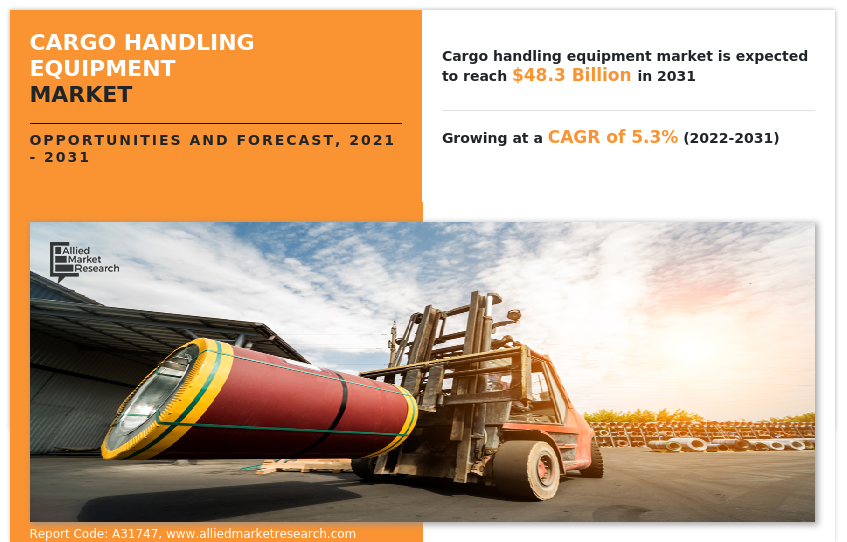
However, lack of control of manufacturers on logistics service, poor infrastructure, along with higher costs of purchasing cargo handling equipment hinder the cargo handling equipment market growth.
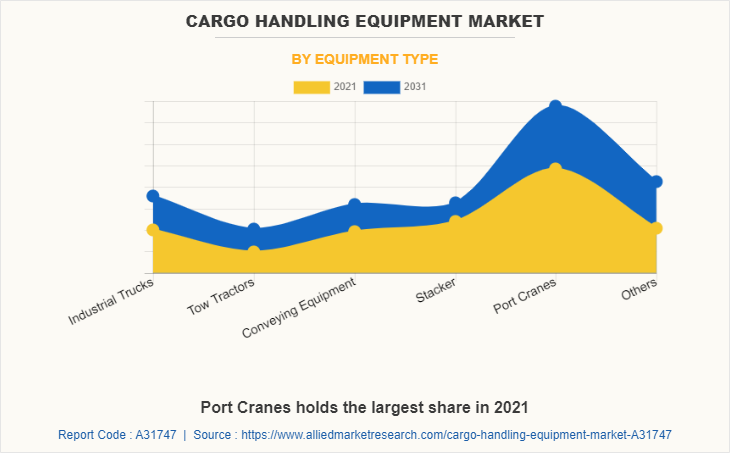
During the outbreak of the COVID-19 pandemic, the construction, manufacturing, hotel, and tourism industries were majorly affected. Manufacturing activities were halted or restricted. This led to a decline in the manufacturing of various equipment used for cargo handling equipment as well as their demand in the market, thereby restraining the growth of the cargo handling equipment market. Conversely, industries are gradually resuming their regular manufacturing and services. This is expected to lead to the re-initiation of cargo handling equipment companies at their full-scale capacities, which helped the cargo handling equipment market to recover by end of 2021.
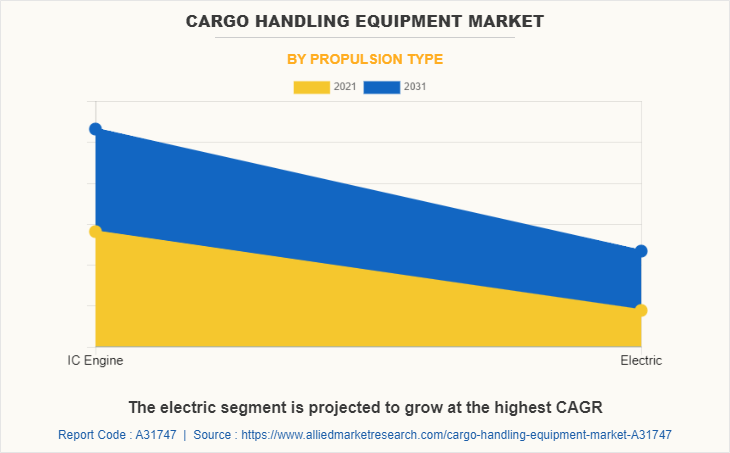
On the contrary, the emergence of last-mile deliveries, logistics automation, and cost-cutting & lead time reduction due to the adoption of cargo handling systems are some of the factors that are anticipated to foster market growth.
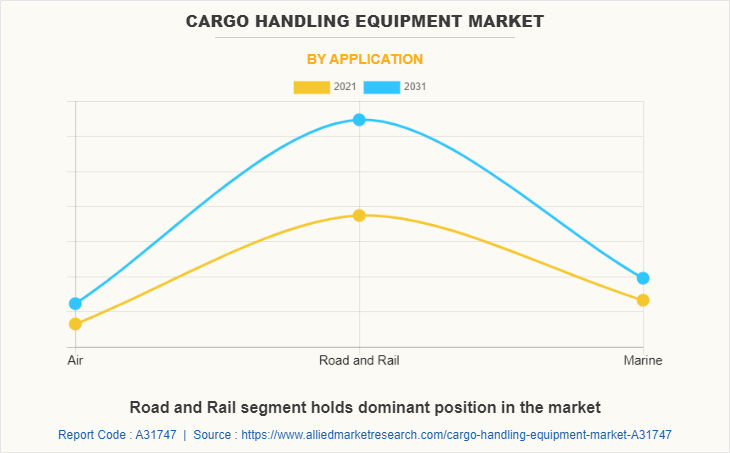
The cargo handling equipment market forecast is done on the basis of equipment type, propulsion type, application, and region. By equipment type, the cargo handling equipment market is fragmented into industrial trucks, tow tractors, conveying equipment, stacker, port cranes, and others. By propulsion type, the market is categorized into IC engine and electric. By application, the market is divided into air, road & rails, and marine. By region, the cargo handling equipment market is analyzed across North America (the U.S., Canada, and Mexico), Europe (Germany, the UK, France, Italy, and rest of Europe), Asia-Pacific (China, India, Japan, South Korea, and rest of Asia-Pacific), and LAMEA (Latin America, Middle East, and Africa).
In 2021, Asia-Pacific was the highest contributor to the global cargo handling equipment market share and is anticipated to secure a leading position with siginifact cargo handling equipment market size.
On the basis of equipment type, in 2021 the port cranes segment dominated the cargo handling equipment market, in terms of revenue, and the others segment is expected to witness growth at the highest CAGR during the forecast period. As per propulsion type, in 2021, the IC engine segment led the cargo handling equipment market, and the electric segment is expected to exhibit the highest CAGR in the near future. By application, the road & rail segment led the market in 2021, in terms of revenue, and the air segment is anticipated to register the highest CAGR during the forecast period. Region-wise, Asia-Pacific garnered the highest revenue in 2021; and is anticipated to register the highest CAGR during the forecast period.
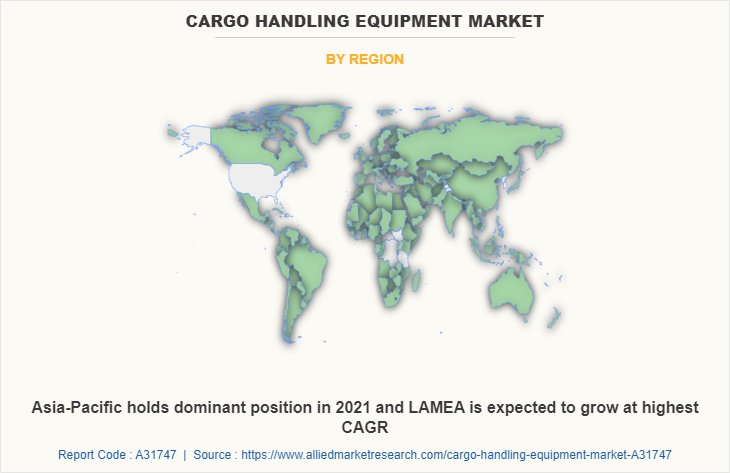
COMPETITION ANALYSIS
The cargo handling equipment market outlook is done via major players profiled in the report such as Anhui Heli Co., Ltd., Hyster-Yale Group, Inc., KION Group AG (KION), Konecranes, Liebherr International AG, Mitsubishi Corporation, Macgregor, Sany Heavy Industry Co Ltd (SHI), Toyota Industries Corp (TICO) and Terex Corporation.
Major companies in the market have adopted product launches, partnerships, business expansion, and acquisition as their key developmental strategies to offer better products and services to customers in the cargo handling equipment market.
Key Benefits For Stakeholders
- This report provides a quantitative analysis of the market segments, current trends, estimations, and dynamics of the cargo handling equipment market analysis from 2021 to 2031 to identify the prevailing cargo handling equipment market opportunities.
- Market research is offered along with information related to key drivers, restraints, and opportunities.
- Porter's five forces analysis highlights the potency of buyers and suppliers to enable stakeholders to make profit-oriented business decisions and strengthen their supplier-buyer network.
- In-depth analysis of the cargo handling equipment market segmentation assists to determine the prevailing market opportunities.
- Major countries in each region are mapped according to their revenue contribution to the global market.
- Market player positioning facilitates benchmarking and provides a clear understanding of the present position of the market players.
- The report includes an analysis of the regional as well as global cargo handling equipment market trends, key players, market segments, application areas, and market growth strategies.
Cargo Handling Equipment Market Report Highlights
| Aspects | Details |
| Market Size By 2031 | USD 48.3 billion |
| Growth Rate | CAGR of 5.3% |
| Forecast period | 2021 - 2031 |
| Report Pages | 220 |
| By Equipment Type |
|
| By Propulsion Type |
|
| By Application |
|
| By Region |
|
| Key Market Players | Mitsubishi Corporation, Terex Corporation, Anhui Heli Co., Ltd., Liebherr International AG, Sany Heavy Industry Co Ltd (SHI), Macgregor, konecranes, KION Group AG (KION), Hyster-Yale Group, Inc., Toyota Industries Corp (TICO) |
Analyst Review
The cargo handling equipment market witnessed a huge demand in Asia-Pacific followed by North America. The highest share of the Asia-Pacific market is attributed to the increase in import and export business. Transporting products by air is more expensive than when compared with transporting commodities by water, which is expected to drive the growth of the market.
In addition, trade barrier such as tariff, which is tax imported on imported goods makes imported goods expensive. Hence, this affects imports and reduces port transportation and shipment. For instance, imports in the U.S. by China is higher as compared to export to China. The U.S. Government implemented a tariff tax system to control imports and to save domestic businesses. Efficient trade activities promote the economic growth of a country. Thus, seaports play a crucial role in economic activities, especially in coastal areas. With the increase in the throughput of passengers traveling via sea and goods transport every year, the need for appropriate and improved port infrastructure requiring efficient cargo handling operations has grown, which, in turn, is expected to foster market growth.
Moreover, market leaders are investing millions of dollars to automate ports by using IoT and AI systems to improve logistics and management of ports. These technological advancements and infrastructural requirements in port infrastructure are likely to create lucrative opportunities for market players.
Major companies in the market have adopted acquisition, business expansion, and agreement as their key developmental strategies to offer better products and services to customers.
The global cargo handling equipment market was valued at $28,517.6 million in 2021 and is projected to reach $48,246.4 million by 2031, registering a CAGR of 5.3% from 2022 to 2031.
The forecast period considered for the global cargo handling equipment market is 2022 to 2031, wherein, 2021 is the base year, 2022 is the estimated year, and 2031 is the forecast year.
The latest version of global cargo handling equipment market report can be obtained on demand from the website.
The base year considered in the global cargo handling equipment market report is 2021.
The top companies holding the market share in the global cargo handling equipment market report are Anhui Heli Co., Ltd., Hyster-Yale Group, Inc., KION Group AG (KION), Konecranes, Liebherr International AG, Mitsubishi Corporation, Macgregor, Sany Heavy Industry Co Ltd (SHI), Toyota Industries Corp (TICO) and Terex Corporation
The top ten market players are selected based on two key attributes - competitive strength and market positioning.
The report contains an exclusive company profile section, where leading companies in the market are profiled. These profiles typically cover company overview, geographical presence, market dominance (in terms of revenue and volume sales), various strategies and recent developments.
By application, the road & rail segment is the highest share holder of cargo handling equipment market.
Loading Table Of Content...


